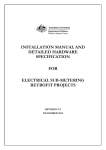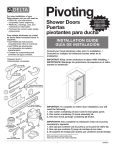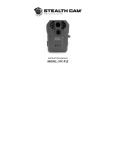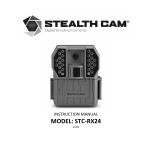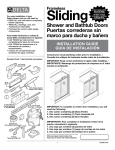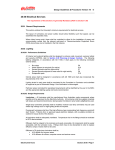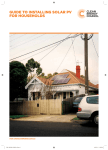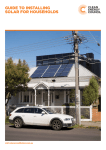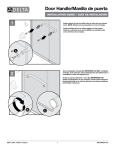Download INSTALLATION MANUAL AND DETAILED HARDWARE
Transcript
INSTALLATION MANUAL AND DETAILED HARDWARE SPECIFICATION FOR ELECTRICAL SUB-METERING IN NEW CONSTRUCTION PROJECTS REVISION V2 DECEMBER 2014 DEPARTMENT OF DEFENCE ELECTRICAL SUB-METERING SPECIFICATION AND INSTALLATION MANUAL DOCUMENT STATUS Version No. Issue Date Amendment Details 1.0 July 2012 Revised draft version issued for comment 1.1 August 2012 Revised draft version issued for comment 1.2 March 2013 Final draft 2 December 2014 MWH Revision; change of contact details, inclusion of Select Solutions as MDA, substitute of Form 2A, minor text changes Amended by Ross McLennan (Energetics) Ross McLennan (Energetics) Ross McLennan (Energetics) Daniel Brooke (MWH) Sub-meter Installation Manual for New Construction Projects Version 2 (December 2014) 2 DEPARTMENT OF DEFENCE ELECTRICAL SUB-METERING SPECIFICATION AND INSTALLATION MANUAL TABLE OF CONTENTS PRELIMINARIES ................................................................................................................................ 6 1. INTRODUCTION................................................................................................................................. 6 SECTION 1 – OVERVIEW ................................................................................................................. 7 1. EQUIPMENT SUPPLY ......................................................................................................................... 7 2. WORKPLACE HEALTH AND SAFETY (WHS) .................................................................................... 7 3. ROLES AND RESPONSIBILITIES ......................................................................................................... 9 SECTION 2 – ELECTRICAL SERVICES DESIGNER RESPONSIBILITIES .......................... 11 1. RELEVANT POLICIES....................................................................................................................... 11 2. IDENTIFYING NSP REQUIRED METERING POINTS ........................................................................... 13 3. ELECTRICAL DESIGN APPROVAL .................................................................................................... 17 4. HARDWARE SELECTION APPROVAL................................................................................................ 17 SECTION 3 – ELECTRICAL CONTRACTOR RESPONSIBILITIES ....................................... 18 1. PROCURE REQUIRED SUB-METER HARDWARE FROM SUPPLIERS .................................................... 18 2. SAFETY ........................................................................................................................................... 18 3. VERIFICATION OF LCD PARAMETERS............................................................................................ 19 4. REMOTE COMMISSIONING AND VERIFICATION............................................................................... 20 5. LABELLING ..................................................................................................................................... 21 6. AS-INSTALLED DOCUMENTATION .................................................................................................. 21 APPENDIX A –HARDWARE SPECIFICATION........................................................................... 22 APPENDIX B –STANDARDS AND LEGISLATION..................................................................... 23 1. STANDARDS AND CODES ................................................................................................................ 23 2. RELEVANT STATE BASED AGENCIES .............................................................................................. 24 APPENDIX C –FORMS ..................................................................................................................... 25 FORM 1C – SIM CARD TRANSFER .............................................................................................. 26 FORM 2A – METER COMMISSIONING....................................................................................... 28 FORM 2B – AS INSTALLED DOCUMENTATION ...................................................................... 31 Sub-meter Installation Manual for New Construction Projects Version 2 (December 2014) 3 DEPARTMENT OF DEFENCE ELECTRICAL SUB-METERING SPECIFICATION AND INSTALLATION MANUAL GLOSSARY OF TERMS AND ABBREVIATIONS AS Australian Standard BCA Building Code of Australia BMS Building Management System CB Circuit Breaker CT Current Transformer DB Distribution Board DEEERMS DPO Directorate of Energy Efficiency, Environmental Resource Management & Sustainability Defence Project Officer Defence Commonwealth Department of Defence Detailed metering schedule EEGO Detailed instructions on appropriate sub-metering points at an existing Defence site, as previously scoped up by the Defence Representative. EMC Electromagnetic Compatibility EMOS Estate Maintenance and Operations Services ESAA Energy Supply Association Australia GPRS General Packet Radio Service GSM Global Systems for Mobile Communications HRC High Rupture Capacity (fuse, usually filled with sand or similar) HVAC Heating, Ventilating and Air-Conditioning IP Internet Protocol LCD Liquid Crystal Display LED Light Emitting Diode LVCT Low Voltage Current Transformer MDA Meter Data Agent MSB Main Switch Board MSSB Mechanical Services Switch Board MTB Meter Test Block NCC National Construction Code NMI National Meter Identifier NSP National Sub-meter Program Energy Efficiency in Government Operations (Policy 2006, second edition 2007) Sub-meter Installation Manual for New Construction Projects Version 2 (December 2014) 4 DEPARTMENT OF DEFENCE ELECTRICAL SUB-METERING SPECIFICATION AND INSTALLATION MANUAL NZS New Zealand Standard RESO Regional Energy/Environmental and Sustainability Manager RMR Remote Meter Read SIM Subscriber Identity Module TWS Transformer Winding Services VT Voltage Transformer WHS Work Health and Safety Sub-meter Installation Manual for New Construction Projects Version 2 (December 2014) 5 DEPARTMENT OF DEFENCE ELECTRICAL SUB-METERING SPECIFICATION AND INSTALLATION MANUAL PRELIMINARIES 1. Introduction The purpose of this manual is to provide information and guidance to incorporate sub-metering into the design and specification of Commonwealth Department of Defence (referred to henceforth as Defence) new infrastructure and major refurbishment projects to meet the requirements of the Defence National Sub-meter Program (NSP). Whilst this manual contains material relevant to electricity industry legislation, Codes of Practice and Standards, it is not intended to provide legal advice on how contractors can meet their own statutory obligations or comply with Legislation, Codes of Practice or industry Standards such as the SAA Wiring Rules AS/NZS 3000. This document provides guidelines for the design and specification of sub-metering for new construction projects, and installation and connection of these energy meters and associated wireless telemetry. Where departures from these guidelines may be necessary, prior consultation with Department of Defence will be required. Note: If there is any inconsistency between these guidelines and the relevant State, Territory and Commonwealth legislation, then the hierarchy shall be that the requirements of the relevant legislation shall prevail in the first instance. Sub-meter Installation Manual for New Construction Projects Version 2 (December 2014) 6 DEPARTMENT OF DEFENCE ELECTRICAL SUB-METERING SPECIFICATION AND INSTALLATION MANUAL SECTION 1 – OVERVIEW This document provides policy guidelines around electrical sub-metering for Defence staff and contractors working on new infrastructure and major refurbishment projects on the Defence Estate. Section 2 provides guidance for consultants working on the electrical services designs of new construction projects, and how to integrate NSP infrastructure into the design process. Section 3 provides guidance for contract administrators and electrical contractors working on new construction projects that will be required to procure, install and commission NSP equipment. 1. Equipment supply All hardware procurement and system design specification, specifically electrical sub-meters and current transformers (CTs), must comply with the generic sub-meter hardware specification (the Specification) as detailed in Appendix A. Any deviation from the Specification will result in meter installations that do not provide accessible data, are unable to be used for energy management and will not meet Defence’s strategic energy management objectives. Guidance can and should be sought from the Defence Representative at any time to assist with assessing specific project details including hardware procurement and contractor pricing arrangements, particularly when selecting appropriate hardware for new sub-meter installations. 2. Workplace Health and Safety (WHS) Switchboard Alterations Switchboard alterations shall be carried out by a reputable switchboard manufacturer holding type test certificates from a NATA accredited testing facility for switchboards that they have manufactured and tested. The fault-withstand currents and durations for the certificates held shall exceed the levels and durations required for these works. The manufacturer shall prepare shop drawings for the benefit of planning the works and for future records. The electrical characteristics of the original switchboard shall not be compromised. Refer to the original nameplate attached to the assembly or to operating and maintenance manuals or records held by the manufacturer or in the absence of other information determine from examination of the existing switchboard. Characteristics considered shall include: Enclosure and degree of protection Temperature rise Protection against electric shock Short circuit withstand strength Internal separation of assemblies Dimensions and ratings of bars and conductors Sub-meter Installation Manual for New Construction Projects Version 2 (December 2014) 7 DEPARTMENT OF DEFENCE ELECTRICAL SUB-METERING SPECIFICATION AND INSTALLATION MANUAL Latent Conditions Prior to commencing the works, advise the Project Officer of any associated works which must be done to satisfy Commonwealth, State and Territory regulations but have not been documented. Commissioning Prior to energising, inspect and test the installation in accordance with AS/NZS 3000 and record the results. For any switchboard alterations affecting the original construction of a switchboard, provide certification from the switchboard manufacturer carrying out the modifications that the modifications have been done in accordance with AS 3439.1 to meet or exceed the performance of the switchboard prior to the works. Test and verify the alterations as a partially type tested assembly (PTTA) in accordance with AS 3439.1 on completion of the works. Complete and submit the required notifications to the inspecting authority. Provide a copy of all notifications to the Inspecting Authority (Regulator), the test results and the commissioning records. Update the existing operating and maintenance manuals with these records, information recommended in AS 3439.1 and information which is required for ongoing maintenance and operation. Include the shop drawings prepared for the alterations. Provide one hard copy and one pdf format data file for this purpose. Commonwealth WHS Act, Regulations and Codes of Practice All design and installation work must comply with the Commonwealth WHS Act and Regulations. Reference shall be made to the relevant Codes of Practice published by Safe Work Australia and current at the time of the work. Recommended guidelines and procedures of the codes of practice shall be implemented. Relevant codes of practice for these works include but are not limited to the following: How to Manage Work Health and Safety Risks Safe Design of Structures Managing Electrical Risks in the Workplace Construction Work Work shall only be carried out on de-energised electrical equipment. Regardless of this, safe work method statements shall be prepared for all work and shall include methods for: Verification of de-energised equipment Securing the isolation Altering the isolation for testing, fault finding and re-energising Restoring power Leaving unfinished work Sub-meter Installation Manual for New Construction Projects Version 2 (December 2014) 8 DEPARTMENT OF DEFENCE ELECTRICAL SUB-METERING SPECIFICATION AND INSTALLATION MANUAL 3. Roles and responsibilities Defence Project Officer The Defence Project Officer (DPO) is the primary Defence contact responsible for managing the new infrastructure or major refurbishment project, under which any sub-metering requirements will be administered. The DPO is the key contact for all queries relating to the project, and is in control of all aspects of the project including those relating to sub-metering. Design Consultant The Design Consultant (referred to henceforth as ‘the Designer’) is the company contracted to design and specify the electrical services for a new infrastructure or major refurbishment project on the Defence Estate. The Designer shall specify: a. The total number of meters required for each building (if any), based on requirements outlined in Section 2; b. The electrical load, buildings and boards that are covered by each meter; c. The exact location and installation/mounting specification for each meter; and d. The exact type of sub-metering hardware to be used by the Contractor (see below). The specified sub-meter hardware shall comply with the generic hardware specification (the Specification) see Appendix A. Installation Contractor The Installation Contractor (referred to henceforth as ‘the Contractor’) is the company contracted to proceed with the sub-meter installation project as part of the standard electrical works in the new infrastructure or major refurbishment project. The Contractor shall be a licensed electrical contractor. The Contractor shall also have appropriate experience with electrical metering systems and electrical metering installations. Defence Representative Daniel Brooke Defence Contractor Environment and Engineering Branch National Sub-metering Program (NSP) 0448575625 [email protected] The Defence Representative is the central point of contact for any questions or queries around the sub-meter program and is responsible for sub-meter strategy, hardware procurement advice and Sub-meter Installation Manual for New Construction Projects Version 2 (December 2014) 9 DEPARTMENT OF DEFENCE ELECTRICAL SUB-METERING SPECIFICATION AND INSTALLATION MANUAL consultation, installation sign-off and expert assistance and advice to Defence in all aspects of the sub-meter program. Authoritative Defence Contact (DEEERMS) Allan O’Connor A/Assistant Director - Development & Implementation Directorate of Energy Efficiency, Environmental Resource Management & Sustainability Environment & Engineering Branch Ph: 02 6266 8209 | Fax: 02 6266 8077 BP26-2-B067 | 26 Brindabella Circuit | Canberra ACT 2600 Email: [email protected] The Authoritative Defence Contact within DEEERMS is responsible for overseeing and approving the activities of the Defence Representative and assuring Defence achieves value for money in all submeter program activities. Meter Data Agent (MDA) This role will be performed by Select Solutions whose contact details are provided below. Select Solutions will control the server/software that communicates with each meter, undertake sub-meter remote commissioning, verify correct and full meter function after installation, manage the meter configuration and provide daily sub-meter interval data to Defence managed reporting systems. Select Solutions Meter Transfers Team 03 9238 6495 Hours of Operation: Monday – Friday 7:30am – 5:00pm For escalations and form submission, please email: [email protected] Hardware Suppliers The hardware suppliers are responsible for supplying meters, modems, SIM card aerials, CTs and meter test blocks to the Contractor on request and invoicing the Contractor for these items. The Defence Representative can provide details of potential hardware suppliers for a complying installation. The Designer shall contact the Defence Representative early in the electrical design phase for assistance as required. Sub-meter Installation Manual for New Construction Projects Version 2 (December 2014) 10 DEPARTMENT OF DEFENCE ELECTRICAL SUB-METERING SPECIFICATION AND INSTALLATION MANUAL SECTION 2 – ELECTRICAL SERVICES DESIGNER RESPONSIBILITIES Section 2 provides guidance to the Designer to allow for integration of compliant NSP infrastructure into new Defence construction projects as per the guidelines outlined below. Please see Section 3 for specific information relating to electrical contractors, NSP hardware supply and commissioning of NSP components. 1. Relevant policies Defence policies relevant to sub-metering in new infrastructure or major refurbishment projects include the: Defence Manual of Infrastructure Engineering – Electrical (MIEE); and Defence Building Energy Performance Manual (BEPM); and Smart Infrastructure Manual – Design & Construction (Smart Infrastructure). This Sub-meter Installation Manual for New Construction Projects is a supplementary document and does not supersede or overwrite the MIEE, the BEPM or SIM. If there is any perceived conflict between these documents seek clarification from the DPO. All Defence new infrastructure and major refurbishment projects must conform to both the MIEE and the BEPM. These documents outline various sub-metering requirements for new buildings (the BEPM as a supplement to the Building Code of Australia section J8 requirements) however the Sub-meter Installation Manual for New Construction Projects outlines additional requirements for new buildings on Defence sites. The key differences between the requirements specified in these policies are: MIEE – Specifies smart electrical metering to be installed for all significant facilities as well as all substations at Defence bases. The MIEE focuses on site-wide Power Control and Monitoring Systems (PCMS) and associated metering systems. The MIEE is not focused on energy management or reporting. BEPM – Supplements the electrical sub-metering requirements in BCA Section J, specifying meters of accuracy Class 1 (as per AS 62052) for internal building loads including airconditioning plant, lighting, appliance power, central hot water supply and internal transport. The BEPM does not focus on site wide or national reporting. Smart Infrastructure - This document references the electrical metering requirements for buildings on the Defence estate. It requires the installation of highly accurate, remotely communicating electrical meters on new Defence buildings in order to meet the reporting requirements of the Commonwealth Energy Efficiency in Government Operations (EEGO) policy and support the National Sub-metering Program (NSP) Sub-meter Installation Manual for New Construction Projects – Requirements in this document are in addition to those outlined in the BEPM and MIEE. This document specifies the installation of highly accurate, remotely communicating electrical meters (NSP meters) on new Sub-meter Installation Manual for New Construction Projects Version 2 (December 2014) 11 DEPARTMENT OF DEFENCE ELECTRICAL SUB-METERING SPECIFICATION AND INSTALLATION MANUAL Defence buildings in order to meet the reporting requirements of the Commonwealth Energy Efficiency in Government Operations (EEGO) policy and more effectively manage energy consumption across the whole estate. There is a general requirement to minimise the number of required meters where possible by grouping multiple similar buildings under one meter. Multiple meters shall only be specified in order to split up energy usage into the required categories such as light and power (L&P) and heating, ventilation and air-conditioning (HVAC) or ‘base building’ consumption for office buildings. Sub-meter Installation Manual for New Construction Projects Version 2 (December 2014) 12 DEPARTMENT OF DEFENCE ELECTRICAL SUB-METERING SPECIFICATION AND INSTALLATION MANUAL 2. Identifying NSP required metering points The specific requirements for new buildings under the NSP are summarised below (note these are in addition to any requirements specified in the BEPM and MIEE). Table 1: NSP requirements for new buildings Building/load type NSP metering requirement New office buildings under 2,000m2 area One NSP meter to cover whole building electricity consumption (note office buildings come under the Facility Group ‘Administration’ as per Table 2 below). New office buildings over 2,000m2 area Minimum of two NSP meters to cover: Office L&P (lighting and appliance power for tenant use) Central HVAC (central mechanical plant including chillers, fans, pumps, electric heating and any central packaged AC units) and base building services such as common area lighting. Requirement to minimise the number of NSP meters to cover these two categories where possible e.g. metering each L&P board is not required under the NSP, only the total L&P load. The Designer shall consult the DPO and the Defence Representative for assistance where more than two NSP meters are required to meter an office building over 2,000m2 area. (Note office buildings come under the Facility Group ‘Administration’ as per Table 2 below). New buildings (other than office buildings) with estimated design electricity consumption over 200,000 kWh p.a. One NSP meter to cover whole building electricity consumption. New building (other than office buildings) with estimated maximum demand over 100 kW One NSP meter to cover the whole building electricity consumption. Where buildings are mixed use i.e. more than one category as per Table 2, if more than 80% of the design electrical consumption can be attributed to a single category assign the building to this category. In other cases refer to the ‘Mixed Use buildings’ section below. Where buildings are mixed use i.e. more than one category as per Table 2, if more than 80% of the peak design electrical load can be attributed to a single category assign the building to this category. Otherwise assign building to ‘Mixed Use’ category. Sub-meter Installation Manual for New Construction Projects Version 2 (December 2014) 13 DEPARTMENT OF DEFENCE ELECTRICAL SUB-METERING SPECIFICATION AND INSTALLATION MANUAL Mixed Use buildings For substations, distribution pillars, facilities or buildings where 80% or more of the design electricity consumption or peak design electrical load can be attributed to a single usage category, these shall be categorised according to the details in Table 2. Where the design electricity consumption or peak design electrical load for individual end uses does not meet the above criteria, the Designer shall specify individual NSP meters to cover each category of consumption in the building (including a total building meter) for example: An office building with design electricity consumption of 90% office space and 10% warehouse space would be categorised as an office. The warehouse component will not require an NSP meter. An office building with design electricity consumption of 50% office, 25% warehouse and 25% workshops will require separate NSP meters on the office, warehouse and workshop loads (in addition to a total building meter). If an individual areas or category of consumption within a ‘Mixed Use’ building meets the 200,000 kWh p.a. design consumption requirement, design and specify an NSP meter for this area. Group of similar buildings (other than office buildings) constructed together under the one project with estimated aggregate design electricity consumption over 200,000 kWh p.a. One NSP meter to cover the group of similar buildings, for example; Five accommodation blocks built together under the one project, aggregate design electricity consumption over 200,000 kWh p.a.; or Two laboratory buildings built together under the one project with aggregate design electricity consumption over 200,000 kWh p.a. Building categories under the NSP are detailed in Table 2 below. New building (other than office buildings) with design electricity consumption under 200,000 kWh p.a. and estimated maximum demand under 100 kW No NSP metering required (note BEPM and MIEE requirements for metering still apply to all new Defence construction projects). Emergency and backup power supplies Emergency or backup power supplies shall be metered where this can be achieved within the guidelines outlined above without requiring any additional metering points. If additional metering points are required then emergency or backup power supplies shall not be separately metered. Sub-meter Installation Manual for New Construction Projects Version 2 (December 2014) 14 DEPARTMENT OF DEFENCE ELECTRICAL SUB-METERING SPECIFICATION AND INSTALLATION MANUAL Special cases There may be special cases on new infrastructure or major refurbishment projects where additional NSP meters may be required, outside the conditions listed above. These will generally include buildings that exhibit large, short duration loads that have a significant impact on a sites energy usage profile. Past examples include priority operational loads such as ship degaussing. In these cases NSP meters may be specified by the Defence Authoritative Contact or Defence Representative and written justification will be provided to the Designer and the DPO. Each sub-meter installed as part of the NSP must be characterised according to the categories listed in Table 2 below. The Facility Group category is the high level category that Defence will use to report under Commonwealth EEGO requirements, these categories are set and new options cannot be added. Underneath each Facility Group there is a variety of Facility Type categories which will be used for internal Defence energy management activities, these are less formal and new options can be added as the program continues to evolve. Table 2: Facility Groups and Types (End Use Categories) Facility Group Facility Types Accommodation Barracks / Shared Accommodation / Single Live In Accommodation, Detached Houses, Apartments, Amenities Administration Offices, Non-Base Offices, Data Centres, Other (to be confirmed with DEEERMS as required) Communications Communications Education and Training Classrooms, Museums, Lecture Theatres, On-Base Child Care Facilities, On-Base Schools, Training Grounds Health Medical Centres, Hospitals, Other (to be confirmed with DEEERMS if required) Laboratories Laboratories Mess Mess Halls, Kitchens, Cafeterias Mixed Substations, distribution pillars, facilities or buildings where 80% or more of the electricity consumption or peak design electrical load cannot be assigned to a single Facility Group Sub-meter Installation Manual for New Construction Projects Version 2 (December 2014) 15 DEPARTMENT OF DEFENCE ELECTRICAL SUB-METERING SPECIFICATION AND INSTALLATION MANUAL Other Substations, Car Parks, Central Plant, Pump Stations, Other loads Recreation Exterior, Gyms, Ovals, Sports Centres, Pools, Other Retail Bank, Food, Post Office, Service Station, Shop, Shopping Centre, Butcher Special Loads Defence Operational high use loads that are required to be metered separately in order to distinguish their consumption from the rest of the facility / base (e.g. ship plug-in, ship degaussing, fuel pumping, wind tunnel) Warehouse and Storage General Stores, Climate Controlled Garages, Warehouses, Other Workshops Workshops, Hangars, Maintenance Facilities Sub-meter Installation Manual for New Construction Projects Version 2 (December 2014) 16 DEPARTMENT OF DEFENCE ELECTRICAL SUB-METERING SPECIFICATION AND INSTALLATION MANUAL 3. Utilising existing or planned metering systems In order to meet the requirements of the NSP for new infrastructure or major refurbishment projects, the Designer may: Specify meter hardware and equipment as per the Specification, which will be remotely read by the MDA. These meters will be commissioned and setup for remote reading, with data hosted on a web-accessible database. This process is outlined in Section 3. OR 4. Specify a process for a planned or existing metering system (such as a BMS or district energy management system) to export sub-meter data which will then be hosted on a web-accessible database for Defence use. Please contact the Authoritative Defence Contact for more information on setting up existing or planned monitoring systems to export available sub-meter data for web access. Electrical design All relevant electrical design drawings and documentation relating to electrical sub-metering and the NSP shall be forwarded by the Designer to project team for review. The project team has responsibility for meeting the NSP requirements in any new infrastructure or major refurbishment project, and this shall be clearly outlined in the design. This will also be reviewed through the Project Review and Approval Process (PRAP). This documentation shall outline: 5. Total number of buildings requiring metering. Total number of meters required. Design consumption and peak demand data for each building. Facility group categorisation for each metering point as per Table 2. Details of any mixed use buildings and metering points for different categories Hardware selection The Designer shall develop a list of specific hardware selections which clearly identify the types and quantities of equipment required to successfully complete the project, following the Specification as detailed in Appendix A. All NSP meters and associated hardware (current transformers, communications gear, meter test blocks and associated cabling) must meet the minimum hardware requirements as specified in Appendix A. Note that SIM cards for remote wireless communications are procured centrally by Defence and managed by the Defence Representative; please see Section 4 for more details. The project team has responsibility for meeting the NSP hardware requirements in any new infrastructure or major refurbishment project, and this shall be clearly outlined in the design documentation. This will also be reviewed through the Project Review and Approval Process (PRAP). Sub-meter Installation Manual for New Construction Projects Version 2 (December 2014) 17 DEPARTMENT OF DEFENCE ELECTRICAL SUB-METERING SPECIFICATION AND INSTALLATION MANUAL SECTION 3 – ELECTRICAL CONTRACTOR RESPONSIBILITIES Section 3 provides specific information to assist the Contractor working on Defence construction projects with NSP hardware procurement and commissioning. 1. Procure required sub-meter hardware from suppliers The Contractor shall procure the approved hardware from the relevant suppliers and organise storage and handling of any delivered hardware prior to installation. Note that the delivery lead time from many suppliers can cause extensive delays and should be factored into project planning. Defence provided SIM cards will only be delivered once a responsible person from the Contractor has been nominated and provided assurances for secure storage and management of SIM cards, as per Form 1C. Delivery time for SIM cards provided by the Defence Representative is limited by standard registered post, and can take up to five working days. The Defence Representative shall send the required number of SIM cards to the Contractor and send a copy of Form 1C listing all SIM cards provided in the delivery. The Contractor shall complete Form 1C on receipt of the SIM card delivery, and nominate a responsible person to safely and securely store the SIM cards prior to installation in meters. The Contractor shall complete Form 1C and provide to the Defence Representative for review before hardware is selected or procured. 2. Safety The Contractor is responsible for ensuring all sub-meter installation projects are conducted in a safe fashion, and adhere to all State, Territory and Federal safety regulations, standards and legislation. This includes: All works must comply with AS/NZS 3000; Safety checks to be carried out on all new and modified work to ensure areas are electrically safe prior to reconnection of electrical supply. Fuse holders and fuses are to be installed, and cover panel for meter test block installed; All doors, panels and covers must be closed, remounted or otherwise made safe before installations are finalised; All changes and modifications to be clearly identified using certified Danger tags, indicating the status of the equipment, the installer and their contact details; and Installation areas to be left in a clean and safe condition when work is completed. All packaging and garbage is to be removed and disposed of responsibly. The Designer shall observe State, Territory and Commonwealth regulations surrounding the use of the radio equipment. The following risks associated with using modems for wireless communications at particular locations shall be addressed by the Designer and communicated to the Contractor where Sub-meter Installation Manual for New Construction Projects Version 2 (December 2014) 18 DEPARTMENT OF DEFENCE ELECTRICAL SUB-METERING SPECIFICATION AND INSTALLATION MANUAL appropriate. Note this list is not exhaustive and only provides general guidance. All relevant laws, regulations and standards must be complied with including Commonwealth Work Health and Safety legislation: Nearby hazardous and/or explosive devices; Aircraft and other transport vehicles; Petrol/gas stations; Hospitals or any other places where medical equipment is in use; Fuel depots, mining, chemical plants etc.; People with personal medical devices, such as hearing aids, pacemakers etc.; and Other electronic equipment. If the Designer identifies any risk associated with using radio modems for wireless communications, the Designer shall recommend and implement strategies that mitigate the risk. Alternatively, the Designer may recommend the removal of the metering point from the scope of works if risks cannot be satisfactorily managed and agreed upon by the DPO, Defence Representative and Authoritative Defence Contact. The Contractor shall comply with all operating specifications of metering equipment to minimise the risk of equipment malfunction or failure. 3. Verification of LCD Parameters Verify that all elements of the installation are working correctly by viewing the following parameters on the meter LCD display. If any of the following parameters are not available on the LCD display, the Contractor will need to contact the MDA who will be able to perform a remote configuration provided wireless communications can be established. Modem signal strength The modem signal strength is a sample taken at the moment when the modem starts up. Minimum signal strength of at least 40% is required, but signal strength of 60% or more is much preferred. Note some meters will display signal strength in decibels (dB). Closing switchboard cabinet doors or the like with the aerial located inside will affect the modem signal strength so ensure cabinet doors are closed as soon as the meter has been powered up and take the signal strength reading after the meter has had time to start up. Modem The modem status is normally shown on the LCD display. Contact the Defence Representative for assistance if required. CT ratio In most cases, the CT ratio will not be set (basic CT ratio will be pre-programmed to 5/5) until the MDA configures the CT ratio remotely during the commissioning process. Sub-meter Installation Manual for New Construction Projects Version 2 (December 2014) 19 DEPARTMENT OF DEFENCE ELECTRICAL SUB-METERING SPECIFICATION AND INSTALLATION MANUAL 4. Remote commissioning and verification The Contractor shall contact the MDA to perform the final commissioning and verification remotely (preferably while the Contractor is still on site so any adjustments can be made in real time). Select Solutions Meter Transfers Team 03 9238 6495 Hours of Operation: Monday – Friday 7:30am – 5:00pm For escalations and form submission, please email: [email protected] The Contractor shall confirm a commissioning schedule with the MDA to allow for appropriate planning of resources to assist with this process. The Contractor shall also advise the DPO when commissioning will occur, and the Defence Representative (or MDA) shall advise the DPO of commissioning outcomes. The following information is required from the Contractor as a minimum to perform the remote commissioning and verification (this information can be provided before the installations are complete if known): Meter serial number; SIM serial number (ICCID), Phone Number (MSISDN) or IP address; CT ratio for installed CTs; and Number of phases, voltage per phase, frequency. The remote commissioning will be completed by the Defence Representative (or MDA) which will include any additional meter configuration required such as setting the following parameters in the meter: IP address (corresponding to the SIM card installed in the radio modem) CT ratio Number of elements/phases Frequency The remote commissioning will ensure the signal strength is satisfactory and that all components have been installed correctly. If any components are not working or have not been installed correctly, it is the responsibility of the Contractor to rectify the problem in consultation with the Defence Representative (or MDA) to perform the remote commissioning and verification. Once the remote commissioning process has been completed by the Defence Representative, the Contractor shall conduct tong testing on each phase of the metered load to complete Form 2A and submit to the Defence Representative as proof of commissioning completion. Once satisfied, the Defence Representative, in consultation with the MDA, will acknowledge the installation as completed and ready for online data access. Sub-meter Installation Manual for New Construction Projects Version 2 (December 2014) 20 DEPARTMENT OF DEFENCE ELECTRICAL SUB-METERING SPECIFICATION AND INSTALLATION MANUAL 5. Labelling Permanent Traffolyte style labels shall be used, either screw fixed or glued. External labelling exposed to the weather shall meet Defence MIEE requirements. 6. Installation Documentation The Contractor shall submit as-installed documentation to the Defence Representative for each project. The required documentation is attached in Appendix C: Designer name, business/company and contact details; Installer name, business/company and contact details; Defence Project Number; Site (base) ID and name; and Summary of work performed i.e. number of NSP meters installed. The documentation is also to contain the following information for each NSP meter: Meter serial number, modem serial number, SIM serial number and SIM IP address; Substation number/ID associated with each meter; Metered facility ID numbers and names as per Defence Estate Management System (DEMS) or equivalent; Metered facility floor area in m2; Facility group and type assigned to sub-meter (end-use category) as per Table 2; Install date and time; Description of CTs (e.g. make/model, size/ratio, solid/split, existing/new etc.); Installation location (e.g. pillar number, facility MSB number, etc.); Supply description / feeder number / circuit number etc.; Number of phases, phase voltages, CT ratios, frequencies; Identification of any equipment stickers or labels used; and Commissioning details including date, settings and outcomes as per Form 2A; Meter make and model. Sub-meter Installation Manual for New Construction Projects Version 2 (December 2014) 21 DEPARTMENT OF DEFENCE ELECTRICAL SUB-METERING INSTALLATION MANUAL APPENDIX A –HARDWARE SPECIFICATION The generic hardware specification (the Specification), Electrical Sub-metering Hardware Specification Version 2 for sub-meter projects is provided as a separate document; please see the appropriate area on the DRN Environment website or contact the Defence Representative for more information. Sub-meter Installation Manual for New Construction Projects Version 2 (December 2014) 22 DEPARTMENT OF DEFENCE ELECTRICAL SUB-METERING INSTALLATION MANUAL APPENDIX B –STANDARDS AND LEGISLATION 1. Standards and Codes All local and National Electrical and Building Codes (Australian Standards) are applicable and must be adhered to. Network standards are to be considered as a guide as the meters are to be installed on a privately owned network. Australian Standards, Legislation and Defence Guidelines: Commonwealth Work Health and Safety Act, regulations and codes of practice; Defence Manual of Infrastructure Engineering – Electrical; AS/NZS 3000 – ‘Electrical Installations’ (Wiring Rules); AS/NZS 1939 – ‘Degrees of Protection Provided by Enclosures for Electrical Equipment’; AS/NZS 3147 – Cable Manufacturing; AS/NZS 61000 – ‘Electromagnetic Compatibility (EMC)’; AS/NZS 60044.1-2003 – Current Transformers; AS/NZS 60044.2-2003 – Voltage Transformers; and All relevant State and Territory based legislation as governed by the agencies listed in Table 3. Sub-meter Installation Manual for New Construction Projects Version 2 (December 2014) 23 DEPARTMENT OF DEFENCE 2. ELECTRICAL SUB-METERING INSTALLATION MANUAL Relevant state based agencies Table 3: State and territory agencies governing electrical safety legislation State Agency Contact ACT ACT Planning and Land Authority, Worksafe ACT www.actpla.act.gov.au NSW NSW Fair Trading (Department of Finances and Services) www.fairtrading.nsw.gov.auhttp://www.environment. NT NT Worksafe www.worksafe.nt.gov.au QLD Electrical Safety Office, Department of Justice www.eso.qld.gov.au www.technicalregulator.sa.gov.au SA Office of the Technical Regulator, Office of Consumer and Business Affairs (licensing only) Tas Workplace Standards Tasmania www.wst.tas.gov.au/electricity Vic Energysafe Victoria http://www.esv.vic.gov.au/ WA Department of Commerce www.energysafety.wa.gov.au www.worksafe.act.gov.au/health_safety nsw.gov.au/ www.ocba.sa.gov.au Sub-meter Installation Manual for New Construction Projects Version 2 (December 2014) 24 DEPARTMENT OF DEFENCE ELECTRICAL SUB-METERING INSTALLATION MANUAL APPENDIX C –FORMS Form 1C – SIM card transfer Form 2A – Commissioning Form 2B – As-Installed Documentation Sub-meter Installation Manual for New Construction Projects Version 2 (December 2014) 25 DEPARTMENT OF DEFENCE ELECTRICAL SUB-METERING INSTALLATION MANUAL FORM 1C – SIM CARD TRANSFER Form to be completed for each batch delivery of SIM cards from Defence to the Contractor. Defence Project Number: Page ____ of ____ Add copies of this table on other pages if more room is required and label pages appropriately. Only provided totals on the last page. SIM card serial number Responsible person (full name) Company Position Phone Email Secure storage for SIM card available Yes / No Yes / No Yes / No Yes / No Yes / No Yes / No Yes / No Yes / No Yes / No Yes / No Yes / No Yes / No Yes / No Yes / No Yes / No Yes / No Yes / No Yes / No Yes / No Sub-meter Installation Manual for New Construction Projects Version 2 (December 2014) 26 DEPARTMENT OF DEFENCE SIM card serial number ELECTRICAL SUB-METERING INSTALLATION MANUAL Responsible person (full name) Company Position Phone Email Secure storage for SIM card available Yes / No Yes / No Yes / No Yes / No Yes / No Yes / No Yes / No Yes / No Yes / No Yes / No Yes / No TOTAL NUMBER OF SIMS DELIVERED Delivery received on (date): Delivery received by: Company: Signature: Date: Defence Representative: Signature: Date: Sub-meter Installation Manual for New Construction Projects Version 2 (December 2014) 27 DEPARTMENT OF DEFENCE ELECTRICAL SUB-METERING INSTALLATION MANUAL FORM 2A – METER COMMISSIONING Form to be completed for each metering point Defence Project Number: Activity Type Job Comments: Site Name Site ID Install By Installer Contact Number Defence Project Number Record ID Meter Removal Details (if applicable) Make & Model: Removed Readings: Meter Number: CT Ratio: Installed Constant: K= 7. Meter Installation Details Make & Model: Rating: Meter Serial Number: Meter Code: CT Ratio: Installed Constant: K= Installed Reading: Meter Program Configuration ID: Meter Security Passwords ID: Installation Physical Location: Communications Installation Details Modem Make: Modem Model: Modem Serial Number: SIM ICCID or MSISDN: Carrier: Telstra Optus Vodafone Other: _____________ IP Address: Remote Communications Tested By: Declaration Completion Date: Commissioning Completed: Name: Signature: NOMW/NOSW Submitted By: Sealing Pliers No: Yes No CT Details Existing/New Manufacturer Type Class Terminals Connected Connected Ratio Available Ratios . Sub-meter Installation Manual for New Construction Projects Version 2 (December 2014) 28 DEPARTMENT OF DEFENCE Phase Polarity Prim/sec (P1/S1) ELECTRICAL SUB-METERING INSTALLATION MANUAL Serial Numbers Primary Current (3) Rated CT Burden (4) Cable route Length x 2 (M) Secondary Current CT constant confirmation Terminal Volts (mV) Admittance Test (mS) (1) Cal. Burden Z=mV/Isec A B C (2) Rated VA (5) Cable conductor size (mm²) Resistivity (6) Est.Burden /Ph=((4)x(5 ))+ Meter burden (7) Only undertake if “Calculated burden” cannot be completed. Refer Jemena installation procedure for values for items 5&7 Burden OK when Cal.burden (1) is less than or equal to rated burden (3) or Est burden (6) BURDEN OK? Yes / No Burden Values Copper Cable Size 1.5mm 2.5mm 4.0 mm 6.0 mm Burden Ω Per Meter 0.0119 0.0071 0.0045 0.00302 Meter Type L&G (Email/AMPY) EDMI MK 3, 6 & 10 Emermet TML 3005 2P Meter Burden Ω 0.0024 0.003 0.0005 0.004 VT Details Make Serial No. Class Rated VA Available Ratios Connected Ratio Terminals Connected Meter Registration Check Phase Secondary Current Volts Power Factor A x x = B x x = C x x = Watts Time / Watts Calculated (5 pulses) Time / Watts Measured (5 pulses) Comments: . Sub-meter Installation Manual for New Construction Projects Version 2 (December 2014) 29 Percentage Error DEPARTMENT OF DEFENCE ELECTRICAL SUB-METERING INSTALLATION MANUAL Check List Item 1. Customer advised of prior to visit? 2. Readings obtained from existing meter If smart meter, contact existing MDP to read prior to removal YES NO N/A Comment Who was advised: 1) 2) 3) Record all register readings. st Record outgoing MP & MDA on 1 page removed meter details section Return all metering equipment labelled to asset owner. within 7 days of completion of works 3. Has Meter Battery been connected? 4. Phase sequence verified correct 5. Check individual phases for current direction. Check direction of meter arrow indicators 6. CT ratios verified If unable to verify meter constant by measurement or visual inspection, please notate on page 3 note section. 7. Meter constant programmed into meter Yes / No 8. Comparison between primary & meter KW. Should be the same taking constant into account Load needs to be stable. 9. Time & date on meter/time clock is correct Time should be EST - Beware of 12hr or 24hr settings 10. Record mtr program No. Check t/clk operation & program if applicable. 11. All test links shorts removed & links closed. 12. All metering connections tightened & checked 13. All meter voltage leds/indicators on. 14. Meter potential’s fused? Yes/ No N/A CT chamber rating: Panel rating: If N/A explain 15. NMI & MP stickers are applied as applicable. 1) NMI/Constant sticker should be applied to meter panel & details filled in legibly 2) CT sticker to CT cabinet 16. If smart meter installation, contact office test installation. Advise meter details as required Call 03 9238 6495 for communications commissioning 17. All metering equipment sealed 18. Customer taking pulses YES / NO Record pulse taken & values on page 3 note section 19. Return any meter certification documents with installation document Comments: . Sub-meter Installation Manual for New Construction Projects Version 2 (December 2014) 30 DEPARTMENT OF DEFENCE ELECTRICAL SUB-METERING INSTALLATION MANUAL FORM 2B – AS INSTALlED DOCUMENTATION Form to be completed for each site Defence Project Number: Total Meter Installations Completed Total Meter Commissioning Completed Mark Up of Existing Electrical Single Line Drawings or New Single Line Drawings Sketched? Do Electrical Single Line Diagrams Show -> Mark Up of Existing Drawings / New Drawings Electrical Supply Reticulation Yes / No Utility Meters & NMI Numbers Yes / No Substation Numbers & Sub Feeds Yes / No Distribution Pillars, MSB, MSSB, DB etc Yes / No Facility IDs Yes / No Meter Serial Numbers Yes / No Works completed to relevant State/Territory standards? Works completed to Commonwealth/National standards? Yes / No Yes / No Has all As-Installed Documentation been submitted to the Regional Contact? YES / NO Completed by: Company: Signature: Date: Regional Contact: Signature: Date: Sub-meter Installation Manual for New Construction Projects Version 2 (December 2014) 31































